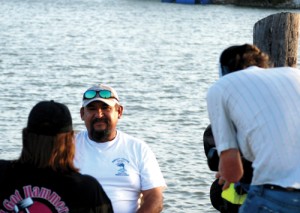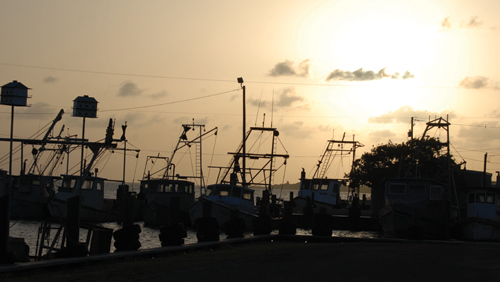When I started writing about Seadrift in October of 2009 what quickly drew me in were the people that make up the small, coastal community. I had moved to the Texas coast three years prior and I was eager to find out about the soil I stepped on each day as it was truly rich in history.
This week I was reminded of the spark that ignited my journey as a columnist in this newspaper. Almost a year ago, I wrote an article about the Seadrift Fishermen Legacy Project fund raiser; today I was fortunate to witness a very significant part of the project.
I arrived at Janie Waghorne’s house, a primary liaison between the Seadrift Fishermen Legacy Project and the Seadrift Centennial Committee. While the two are not connected, the Seadrift Fishermen Legacy Project’s mission which began in the summer of 2011 is to honor local fisherman at the event celebrating Seadrift’s Centennial, which is scheduled to be held on Saturday, December 1st. I’ve known Janie for several years; I remember when she sat down with me to interview Mildred Hill as if it were yesterday. Mildred was one of the first people I interviewed for The Dolphin Talk.
Janie introduced me to two very important people who are vital to the project: financial advisor, Pam Booton of Dominion Investor Services and Austin videographer Ken Dvorak, working with Wilson-Brown state of the art professional filming equipment. Pam has been an intricate link between Seadrift and the Austin community. Her dedication to the project is evident, “It’s a history that would be lost; Seadrift is a community at a crossroads.” She explained the various goals which the members of the project have set out to accomplish; Diane Wilson, Sabrina Williams, Laurie Weaver and Donna Sue Williams plus the aforementioned. Artists, Reji Thomas, Rebecca Byrd Bretz and Aubrey Parker have been important catalysts in the project.
First and foremost — to address today’s visit — day three of filming a documentary about Seadrift’s local fishermen. The group’s plans are to make a two hour DVD with approximately fourteen interviews, post clips onto the website, www.seadriftfishermencelebration.org and create a calendar with still shots from the videos. As I learned more about the objective, Augustine Rivera, aka Augie, arrived.
Augie was born in Placedo, but he was raised in Seadrift. His passion for fishing San Antonio Bay waters was immediately transparent. “It’s a dying breed; if I could earn a decent living at shrimping, that’s what I’d be doing right now,” he expressed. My excitement grew as we caravaned to the harbor for the interview, the day was near it’s end and we had little light left. Within twenty minutes Pam was asking Augustine questions about his career as a commercial fisherman with Ken behind the video camera. I was careful and withdrawn as I didn’t want to invade their space or make noise.
Augie has been fishing the bay’s waters since the late 70s with captains such as Steve Waghorne, Rusty Spencer, Dennis Gholke, Froggie Sanders and Dwayne Helms. While he did not own his own boat, he enjoyed being a deckhand. Early in the interview something resonated deep within me when he said, “I was taught growing up to always say, ‘Yes sir and yes ma’am.’ Captain Dennis Gholke told me as soon as I stepped onto his shrimp boat, ‘it’s just you and me on this boat. There’s no need to call me sir.’”
I can remember the first publisher I worked for addressing me the same way. As Augustine let us view into a small window of commercial fishing, I realized how broad of a term “fishing” can be. Sport fishing can be competitive, but commercial fishing is an entirely different beast. While his experience fishing the coastal waters as a career has helped his hobby, he recalls his favorite days being those of catching brownie shrimp and oysters, even if he only brought home $20 a day.
Freedom for this fisherman felt like the cool breeze of trolling familiar waters. “I miss going to work with no shoes, no shirt and just cut off shorts.” Augie worked the coastal waters for years, but had to juggle making a living, just like the rest of us, wrestling his passion all the while. He has now been employed with Dow Chemical Company for twenty-one years.
In 1991, he started working with Dow’s corporate offices and has since traveled to places such as Malaysia, Canada and Holland. “Traveling to other countries made me realize how much we have here in the U.S. We are very fortunate. Don’t get me wrong; the people there made me feel welcome, but made me admire my home.”
I will always remember talking to Augie with a local shrimp boat docked in the background on the very day Big Net Season opened. Cool as a cucumber with his shades, talking about fishing the waters we view everyday, all he did was smile and laugh. “We would go out the evening of the fourteenth and watch, testing the waters, waiting for the next morning. There were tons of boats going out.” Now there are only a handful. I’ve stalked redfish a time or two, but can not wrap my mind around being in twelve to fifteen foot swells. All the while, Augustine says he never felt afraid, it was simply a way of life.
Why has commercial fishing declined? According to Augie, a multitude of factors could be taken into account: over fishing, freshwater droughts, red tide and flooding. “You never heard about red tide in the 70s,” he said appropriately, as the red tide is continually being closely monitored along the Texas coast.
As the sun set and the beautiful pinks and purples accented the never-ending waves over the green palm trees, I think we all realized that the sun was setting upon one of the most important aspects of this community. I’m glad to have been included in this project, plus I’m eager to tell you more about the artists.
Till next time!



